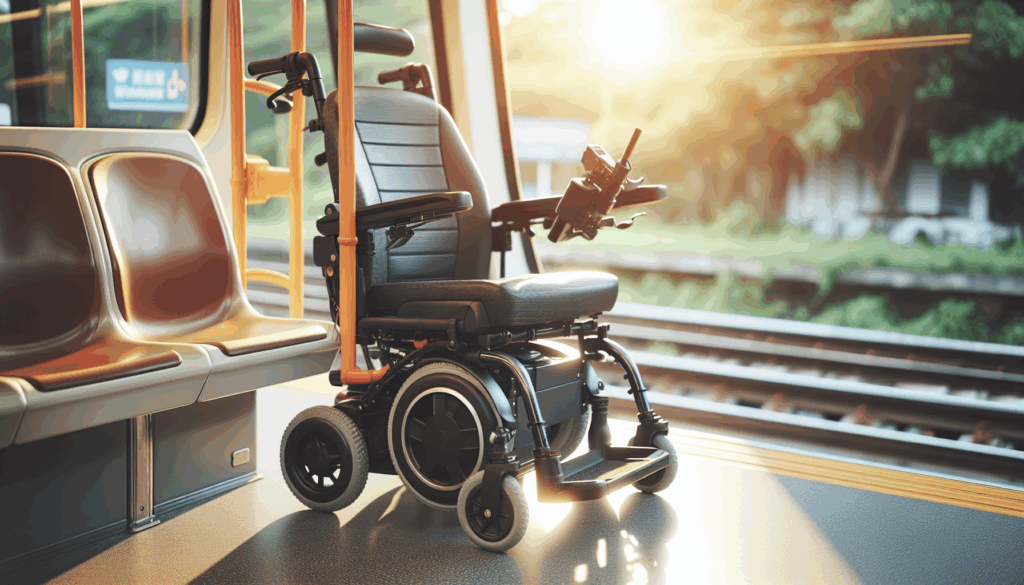
In today’s world, the intersection of technology and healthcare has given rise to innovative solutions that enhance mobility and improve quality of life for individuals with limited mobility. One such advancement is the electric wheelchair, designed not only for convenience but also for optimal ergonomics. This blog explores how proper ergonomic designs, like those found in the eDegree EW7 Auto Reclinable Electric Wheelchair, can significantly affect recovery processes by providing customizable positioning, comfort, and support. With features such as an auto-reclining backrest and a lightweight frame that accommodates a range of users, understanding the role of ergonomics in electric wheelchairs is essential for maximizing recovery and overall well-being.
Understanding Ergonomics and Its Importance in Mobility Devices
Ergonomics is the science of designing and arranging things people use to fit the human body and its cognitive abilities, ensuring comfort and efficiency during use. In the context of mobility devices, especially electric wheelchairs, ergonomics plays a pivotal role in facilitating recovery for users. An electric wheelchair that is ergonomically designed can significantly decrease discomfort and fatigue, allowing users to maintain optimal posture and positioning while navigating their environment. Features like adjustable seating, supportive backrests, and controls that are easily accessible contribute to enhancing the user’s experience, minimizing strain on the body, and promoting a sense of independence.
The eDegree EW7 Auto Reclinable Electric Wheelchair exemplifies ergonomics with its auto-reclinable backrest and supportive frame made from magnesium-aluminum. This not only boosts comfort but also aids users in finding the most natural and supportive position for prolonged use. Given its features, including a pneumatic rear tire system that ensures a smooth ride and the ability to support a maximum load of 150kg, the EW7 is designed to accommodate diverse needs while enhancing recovery. As users engage with their environment more comfortably, the potential for recovery processes improves, showcasing the importance of ergonomic design in mobility devices like electric wheelchairs.
How Electric Wheelchairs Promote Comfort and Accessibility
Electric wheelchairs are designed with a strong emphasis on comfort and accessibility, features that play a crucial role in promoting recovery for users.
One notable example is the eDegree EW7 Auto Reclinable Electric Wheelchair, which includes an auto-reclinable backrest that allows for customizable positioning. This design not only ensures that users maintain optimal posture but also alleviates pressure points, which can significantly enhance comfort during prolonged use. With a maximum load capacity of 150kg, the EW7 caters to a wide range of individuals, ensuring that comfort is not sacrificed for functionality. The use of pneumatic rear tires paired with honeycomb front tires further contributes to a smoother ride, making daily activities more enjoyable and accessible for users recovering from injuries or surgeries.
Moreover, the eDegree EW7 is engineered for practicality and convenience, folding down to a compact size of 63x37x75cm for easy storage and transport. This portability encourages users to engage in outdoor activities, which can be essential for both physical and psychological rehabilitation. The electric wheelchair also boasts a 15km range with an impressive top speed of 8km/h, enabling users to navigate their environments with ease. By prioritizing ergonomics and providing essential features that support comfort and mobility, electric wheelchairs like the eDegree EW7 are transforming recovery experiences, empowering users to regain their independence and confidence during the healing process.
The Significance of Customizable Positioning in Recovery
Customizable positioning is a critical factor in recovery for electric wheelchair users. The ability to adjust the backrest to a preferred angle, as seen in the eDegree EW7 Auto Reclinable Electric Wheelchair, empowers users to find their most comfortable seating posture. This adjustable feature not only enhances comfort throughout the day but also allows for improved blood circulation and reduces the risk of pressure sores. By providing the option to recline the wheelchair, users can relieve strain on their muscles and joints, helping them to manage pain effectively and promote a more positive healing environment during their recovery process.
Incorporating ergonomic design into electric wheelchairs, like the eDegree EW7, plays an essential role in providing users with the ability to customize their seating experience. This adaptability aids individuals in achieving optimal alignment, which can lead to better posture and reduced fatigue. Wheelchairs designed with user comfort in mind contribute to an overall feeling of independence, enabling users to engage more actively in daily activities. Therefore, the significance of customizable positioning in electric wheelchairs cannot be overlooked, as it greatly affects the user’s ability to recover smoothly and enhances their overall quality of life.
Exploring the eDegree EW7 Features: A Case Study in Ergonomics
The eDegree EW7 Auto Reclinable Electric Wheelchair exemplifies how thoughtful ergonomic design can significantly enhance user recovery and comfort. At the forefront of these features is its auto-reclining backrest, which allows users to find their ideal seating position for personalized comfort. This adaptability is crucial for long-term users, as staying in one position for extended periods can lead to discomfort or potential health issues. Coupled with a robust magnesium-aluminum frame, the EW7 ensures that users can rely on its durability without sacrificing comfort. With a maximum load capacity of 150kg, it is versatile enough to accommodate a wide range of users, allowing them to maintain an active and engaging lifestyle.
Beyond comfort, the eDegree EW7 is designed for performance, featuring a 15km range and a swift top speed of 8km/h across five-speed modes. This combination serves users who need mobility without exerting excessive physical strain, which can accelerate recovery processes. Additionally, the pneumatic rear tires and honeycomb front tires provide a smoother ride over various terrains, reducing jarring movements that could hinder rehabilitation efforts. When folded into a compact size of 63×37×75cm, the EW7 offers convenient storage options, ensuring that maintaining one’s mobility aids is effortless and stress-free in everyday life.

Impact of Surface and Tire Design on User Experience
The impact of surface and tire design on the user experience of electric wheelchairs cannot be overstated. A well-designed tire system can significantly enhance the comfort and safety of users, especially for those who rely on an electric wheelchair for extended periods. The eDegree EW7 Auto Reclinable Electric Wheelchair features pneumatic rear tires and honeycomb front tires, which work together to provide a smooth and stable ride over various terrains. This thoughtful combination reduces shock and vibration during use, allowing users to focus on their recovery without the distraction of uncomfortable bumps or jolts. Furthermore, the wheelchair’s ability to recline adds a layer of ergonomic support, ensuring users can adjust their posture for optimal comfort while navigating uneven surfaces.
Moreover, the wheelchair’s ergonomic design allows for easy maneuverability, making it easier for users to access different environments. Whether indoors or outdoors, the eDegree EW7 electric wheelchair provides a seamless experience, promoting independence and overall well-being. When users feel comfortable and secure, it enhances their ability to recover effectively. With a maximum load capacity of 150kg, this electric wheelchair supports a wide range of users, contributing further to its appeal in rehabilitation settings. Ultimately, the thoughtful integration of surface and tire design directly influences user experience, making a significant difference in how individuals recover and engage with their surroundings.
The Connection Between Proper Ergonomics and Faster Recovery Rates
Proper ergonomics play a crucial role in enhancing recovery rates for individuals using electric wheelchairs. An ergonomically designed electric wheelchair, such as the eDegree EW7, features an auto-reclinable backrest that allows users to adjust their seating position according to their comfort and needs. This customizable positioning helps alleviate pressure points, which can lead to improved circulation, reduced fatigue, and overall better posture. Comfortable seating and proper alignment are essential for individuals recovering from injuries or surgeries, as they significantly influence the healing process and day-to-day comfort levels. Furthermore, the advanced magnesium-aluminum frame offers a lightweight yet sturdy design, ensuring that users can maneuver easily without unnecessary strain.
In addition to comfort, the eDegree EW7 supports a maximum load capacity of 150kg and offers an impressive 15km range, making it suitable for long-duration use. The pneumatic rear tires and honeycomb front tires provide stable and smooth rides, which further enhances the overall experience. The ability to fold the wheelchair to a compact size of 63×37×75cm allows for easy transportation, ensuring that users can remain active in their recovery journey, whether at home or on the go. All these ergonomic features collectively contribute to faster recovery rates, empowering individuals to regain their mobility and independence efficiently.
Real-Life Testimonials: User Experiences with Ergonomic Electric Wheelchairs
Many users of electric wheelchairs, particularly the eDegree EW7, have reported a transformative experience regarding their recovery and overall well-being. The auto-reclining backrest of the eDegree EW7 allows users to find their ideal position easily, significantly contributing to comfort and minimizing the risk of pressure sores. Users have shared how this customizable positioning helped them maintain better circulation, which is essential for recovery. For individuals with limited mobility, having an electric wheelchair that caters to their ergonomic needs can make a substantial difference in their daily lives, enabling them to engage in various activities without the worry of discomfort or fatigue.
Moreover, the eDegree EW7’s lightweight magnesium-aluminum frame ensures easy maneuverability, allowing users to navigate different terrains with minimal effort. Testimonies have highlighted how the seamless ride, facilitated by pneumatic rear tires and honeycomb front tires, promotes a sense of independence. Many users express that the ergonomic design not only aids in physical rehabilitation but also enhances their mental health, as they feel more in control and capable of participating in their communities. This multi-faceted approach to ergonomic design underscores the importance of thoughtful engineering in promoting recovery among electric wheelchair users.
Future Trends in Ergonomic Design for Electric Wheelchairs
As technology advances, the future of ergonomic design in electric wheelchairs, such as the eDegree EW7, promises to be more user-focused than ever. The integration of smart features like auto-reclining mechanisms not only enhances comfort but also contributes to a therapeutic user experience. These innovations make it easier for users to find an optimal seating position, which is crucial for improving circulation and reducing pressure sores during prolonged use. The emphasis on lightweight yet durable materials, like the magnesium-aluminum frame of the EW7, will continue to shape the design of electric wheelchairs, allowing for greater portability and ease of use for individuals with mobility challenges.
Moreover, advancements in wheel and tire technology will play a significant role in the future of ergonomic electric wheelchairs. The eDegree EW7 features pneumatic rear tires and honeycomb front tires that ensure a smooth ride, reducing impact on the user’s body during travel. As manufacturers increasingly focus on user feedback, we can expect more customizable options that support different body types and personal preferences. Ultimately, the future of ergonomic design in electric wheelchairs will not only enhance comfort and mobility but also significantly contribute to the recovery process for users, allowing for an improved quality of life.

Embracing Ergonomics for Enhanced Recovery
In conclusion, the right ergonomics play a crucial role in the recovery journey for individuals utilizing an electric wheelchair. The eDegree EW7 Auto Reclinable Electric Wheelchair stands out not only for its innovative features but also for its focus on comfort and user experience. Its auto-reclinable backrest allows users to find the most comfortable position, which can significantly reduce strain and enhance overall satisfaction during use. Such features are essential in aiding recovery, as they provide the necessary support and comfort needed for a more serene mobility experience.
By investing in a well-designed electric wheelchair like the eDegree EW7, users can maximize their mobility while minimizing discomfort and potential setbacks during recovery. With its impressive specifications, including a robust battery range, customizable speed modes, and a folding design for convenient storage, the eDegree EW7 ensures that individuals can enjoy a smooth ride without compromising on their comfort and health. Embracing ergonomics in electric wheelchair design is not just about luxury; it’s a fundamental aspect of promoting effective recovery and empowering users to reclaim their autonomy.
